Evaluating Sustainable Tourism Management in Scotland, UK
VerifiedAdded on 2023/01/05
|20
|6627
|46
Report
AI Summary
This report provides an overview of sustainable and responsible tourism management with a focus on Scotland as a case study. It examines the evolution of these concepts, the role of global organizations like the UNWTO in promoting sustainability, and the principles of tourism development and planning. The report evaluates the social, environmental, economic, and cultural impacts of tourism practices, analyzes stakeholder contributions to sustainable tourism, and assesses the effectiveness of sustainable management in various tourist destinations worldwide. It also explores how tourism is managed responsibly in Scotland, addressing the needs of visitors and host communities while minimizing negative impacts and fostering local economic benefits. The report is intended to provide insights into the complexities and challenges of achieving sustainable tourism in a developed destination.
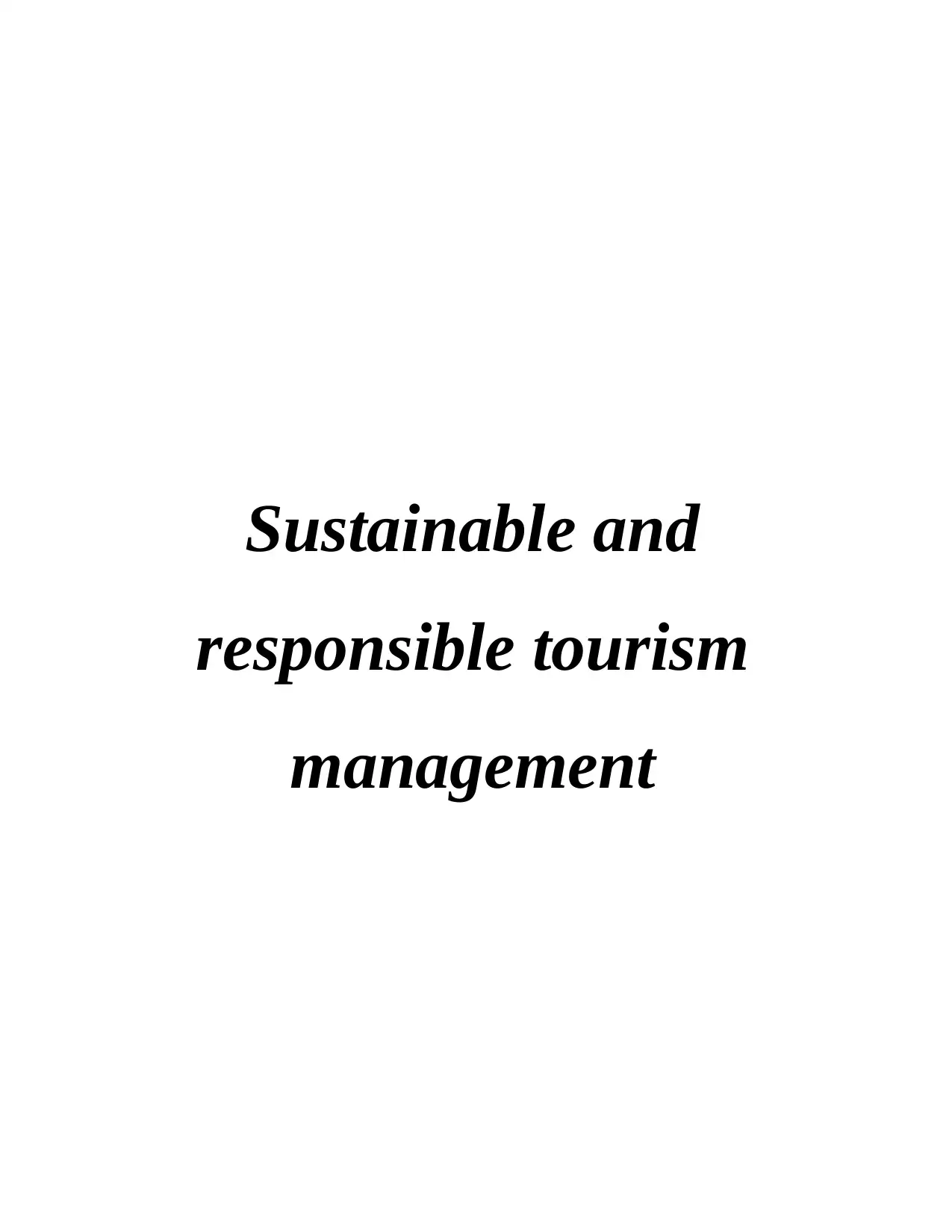
Sustainable and
responsible tourism
management
responsible tourism
management
Paraphrase This Document
Need a fresh take? Get an instant paraphrase of this document with our AI Paraphraser
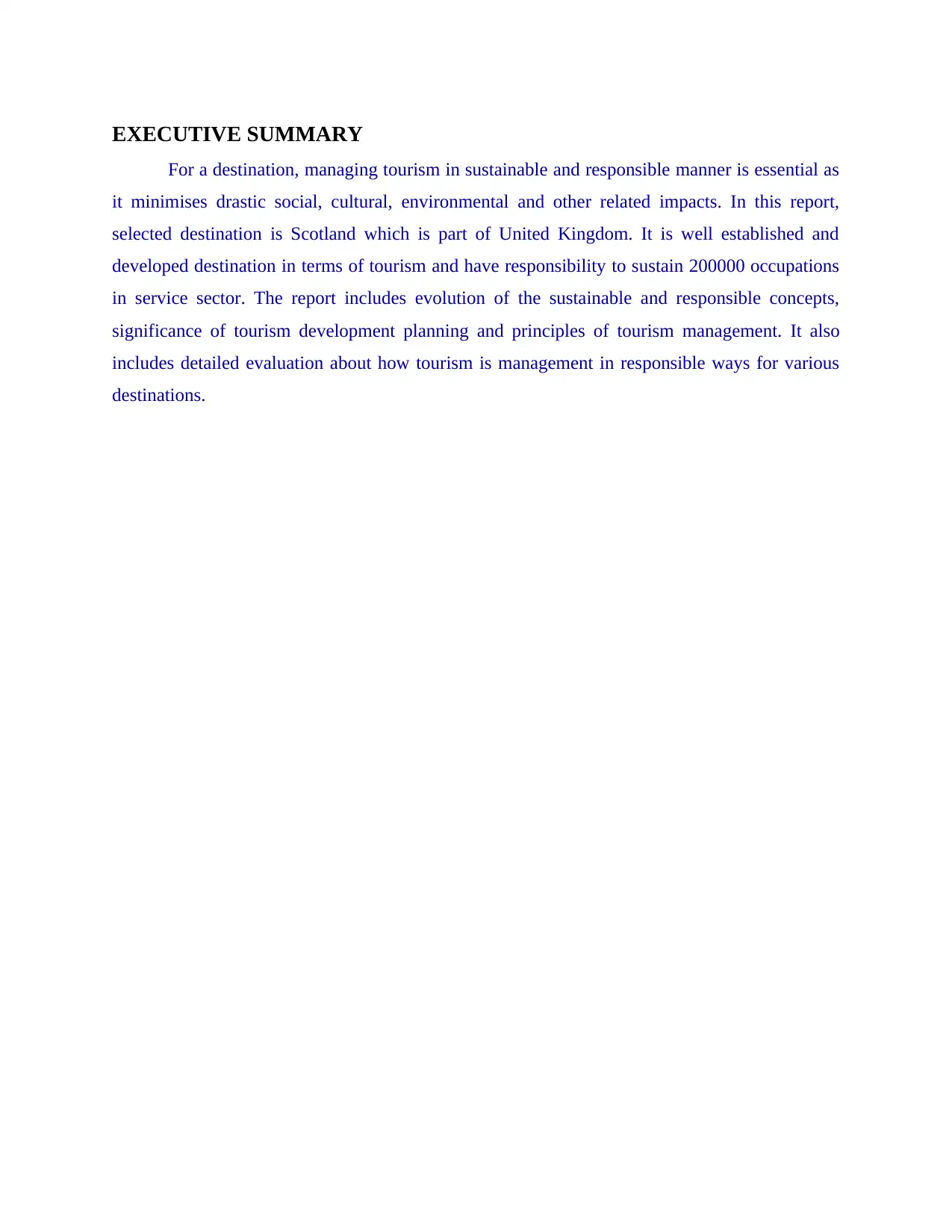
EXECUTIVE SUMMARY
For a destination, managing tourism in sustainable and responsible manner is essential as
it minimises drastic social, cultural, environmental and other related impacts. In this report,
selected destination is Scotland which is part of United Kingdom. It is well established and
developed destination in terms of tourism and have responsibility to sustain 200000 occupations
in service sector. The report includes evolution of the sustainable and responsible concepts,
significance of tourism development planning and principles of tourism management. It also
includes detailed evaluation about how tourism is management in responsible ways for various
destinations.
For a destination, managing tourism in sustainable and responsible manner is essential as
it minimises drastic social, cultural, environmental and other related impacts. In this report,
selected destination is Scotland which is part of United Kingdom. It is well established and
developed destination in terms of tourism and have responsibility to sustain 200000 occupations
in service sector. The report includes evolution of the sustainable and responsible concepts,
significance of tourism development planning and principles of tourism management. It also
includes detailed evaluation about how tourism is management in responsible ways for various
destinations.
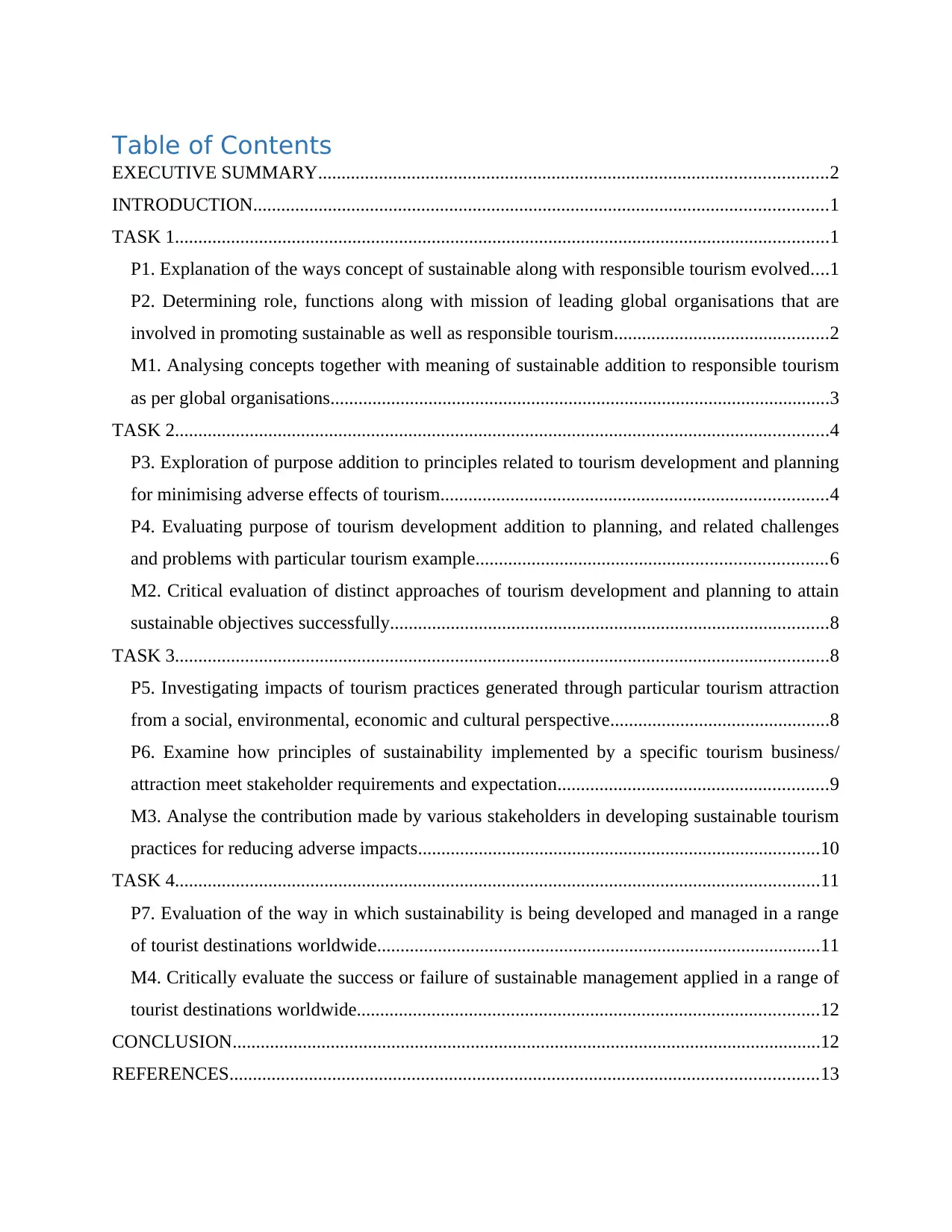
Table of Contents
EXECUTIVE SUMMARY.............................................................................................................2
INTRODUCTION...........................................................................................................................1
TASK 1............................................................................................................................................1
P1. Explanation of the ways concept of sustainable along with responsible tourism evolved....1
P2. Determining role, functions along with mission of leading global organisations that are
involved in promoting sustainable as well as responsible tourism..............................................2
M1. Analysing concepts together with meaning of sustainable addition to responsible tourism
as per global organisations...........................................................................................................3
TASK 2............................................................................................................................................4
P3. Exploration of purpose addition to principles related to tourism development and planning
for minimising adverse effects of tourism...................................................................................4
P4. Evaluating purpose of tourism development addition to planning, and related challenges
and problems with particular tourism example...........................................................................6
M2. Critical evaluation of distinct approaches of tourism development and planning to attain
sustainable objectives successfully..............................................................................................8
TASK 3............................................................................................................................................8
P5. Investigating impacts of tourism practices generated through particular tourism attraction
from a social, environmental, economic and cultural perspective...............................................8
P6. Examine how principles of sustainability implemented by a specific tourism business/
attraction meet stakeholder requirements and expectation..........................................................9
M3. Analyse the contribution made by various stakeholders in developing sustainable tourism
practices for reducing adverse impacts......................................................................................10
TASK 4..........................................................................................................................................11
P7. Evaluation of the way in which sustainability is being developed and managed in a range
of tourist destinations worldwide...............................................................................................11
M4. Critically evaluate the success or failure of sustainable management applied in a range of
tourist destinations worldwide...................................................................................................12
CONCLUSION..............................................................................................................................12
REFERENCES..............................................................................................................................13
EXECUTIVE SUMMARY.............................................................................................................2
INTRODUCTION...........................................................................................................................1
TASK 1............................................................................................................................................1
P1. Explanation of the ways concept of sustainable along with responsible tourism evolved....1
P2. Determining role, functions along with mission of leading global organisations that are
involved in promoting sustainable as well as responsible tourism..............................................2
M1. Analysing concepts together with meaning of sustainable addition to responsible tourism
as per global organisations...........................................................................................................3
TASK 2............................................................................................................................................4
P3. Exploration of purpose addition to principles related to tourism development and planning
for minimising adverse effects of tourism...................................................................................4
P4. Evaluating purpose of tourism development addition to planning, and related challenges
and problems with particular tourism example...........................................................................6
M2. Critical evaluation of distinct approaches of tourism development and planning to attain
sustainable objectives successfully..............................................................................................8
TASK 3............................................................................................................................................8
P5. Investigating impacts of tourism practices generated through particular tourism attraction
from a social, environmental, economic and cultural perspective...............................................8
P6. Examine how principles of sustainability implemented by a specific tourism business/
attraction meet stakeholder requirements and expectation..........................................................9
M3. Analyse the contribution made by various stakeholders in developing sustainable tourism
practices for reducing adverse impacts......................................................................................10
TASK 4..........................................................................................................................................11
P7. Evaluation of the way in which sustainability is being developed and managed in a range
of tourist destinations worldwide...............................................................................................11
M4. Critically evaluate the success or failure of sustainable management applied in a range of
tourist destinations worldwide...................................................................................................12
CONCLUSION..............................................................................................................................12
REFERENCES..............................................................................................................................13
⊘ This is a preview!⊘
Do you want full access?
Subscribe today to unlock all pages.

Trusted by 1+ million students worldwide
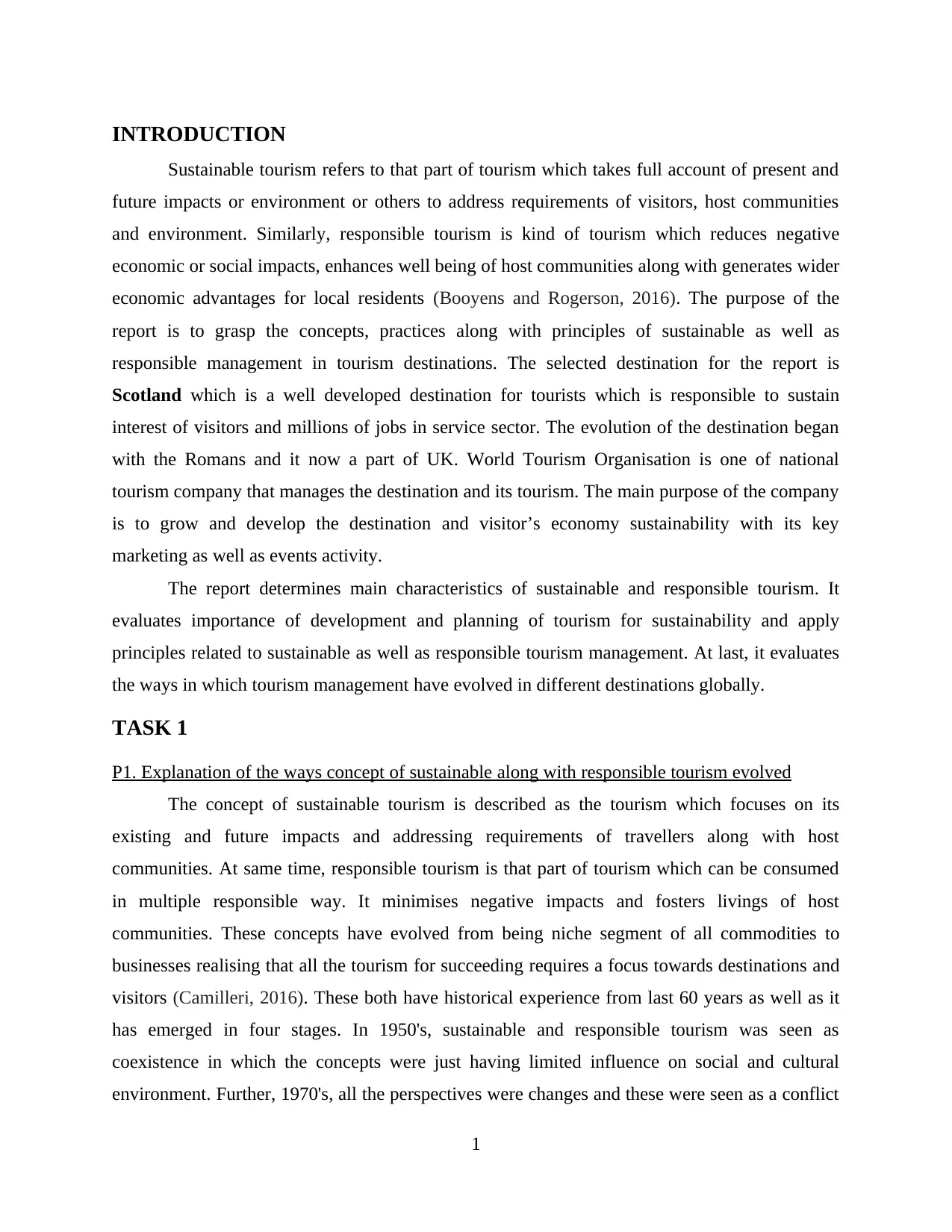
INTRODUCTION
Sustainable tourism refers to that part of tourism which takes full account of present and
future impacts or environment or others to address requirements of visitors, host communities
and environment. Similarly, responsible tourism is kind of tourism which reduces negative
economic or social impacts, enhances well being of host communities along with generates wider
economic advantages for local residents (Booyens and Rogerson, 2016). The purpose of the
report is to grasp the concepts, practices along with principles of sustainable as well as
responsible management in tourism destinations. The selected destination for the report is
Scotland which is a well developed destination for tourists which is responsible to sustain
interest of visitors and millions of jobs in service sector. The evolution of the destination began
with the Romans and it now a part of UK. World Tourism Organisation is one of national
tourism company that manages the destination and its tourism. The main purpose of the company
is to grow and develop the destination and visitor’s economy sustainability with its key
marketing as well as events activity.
The report determines main characteristics of sustainable and responsible tourism. It
evaluates importance of development and planning of tourism for sustainability and apply
principles related to sustainable as well as responsible tourism management. At last, it evaluates
the ways in which tourism management have evolved in different destinations globally.
TASK 1
P1. Explanation of the ways concept of sustainable along with responsible tourism evolved
The concept of sustainable tourism is described as the tourism which focuses on its
existing and future impacts and addressing requirements of travellers along with host
communities. At same time, responsible tourism is that part of tourism which can be consumed
in multiple responsible way. It minimises negative impacts and fosters livings of host
communities. These concepts have evolved from being niche segment of all commodities to
businesses realising that all the tourism for succeeding requires a focus towards destinations and
visitors (Camilleri, 2016). These both have historical experience from last 60 years as well as it
has emerged in four stages. In 1950's, sustainable and responsible tourism was seen as
coexistence in which the concepts were just having limited influence on social and cultural
environment. Further, 1970's, all the perspectives were changes and these were seen as a conflict
1
Sustainable tourism refers to that part of tourism which takes full account of present and
future impacts or environment or others to address requirements of visitors, host communities
and environment. Similarly, responsible tourism is kind of tourism which reduces negative
economic or social impacts, enhances well being of host communities along with generates wider
economic advantages for local residents (Booyens and Rogerson, 2016). The purpose of the
report is to grasp the concepts, practices along with principles of sustainable as well as
responsible management in tourism destinations. The selected destination for the report is
Scotland which is a well developed destination for tourists which is responsible to sustain
interest of visitors and millions of jobs in service sector. The evolution of the destination began
with the Romans and it now a part of UK. World Tourism Organisation is one of national
tourism company that manages the destination and its tourism. The main purpose of the company
is to grow and develop the destination and visitor’s economy sustainability with its key
marketing as well as events activity.
The report determines main characteristics of sustainable and responsible tourism. It
evaluates importance of development and planning of tourism for sustainability and apply
principles related to sustainable as well as responsible tourism management. At last, it evaluates
the ways in which tourism management have evolved in different destinations globally.
TASK 1
P1. Explanation of the ways concept of sustainable along with responsible tourism evolved
The concept of sustainable tourism is described as the tourism which focuses on its
existing and future impacts and addressing requirements of travellers along with host
communities. At same time, responsible tourism is that part of tourism which can be consumed
in multiple responsible way. It minimises negative impacts and fosters livings of host
communities. These concepts have evolved from being niche segment of all commodities to
businesses realising that all the tourism for succeeding requires a focus towards destinations and
visitors (Camilleri, 2016). These both have historical experience from last 60 years as well as it
has emerged in four stages. In 1950's, sustainable and responsible tourism was seen as
coexistence in which the concepts were just having limited influence on social and cultural
environment. Further, 1970's, all the perspectives were changes and these were seen as a conflict
1
Paraphrase This Document
Need a fresh take? Get an instant paraphrase of this document with our AI Paraphraser
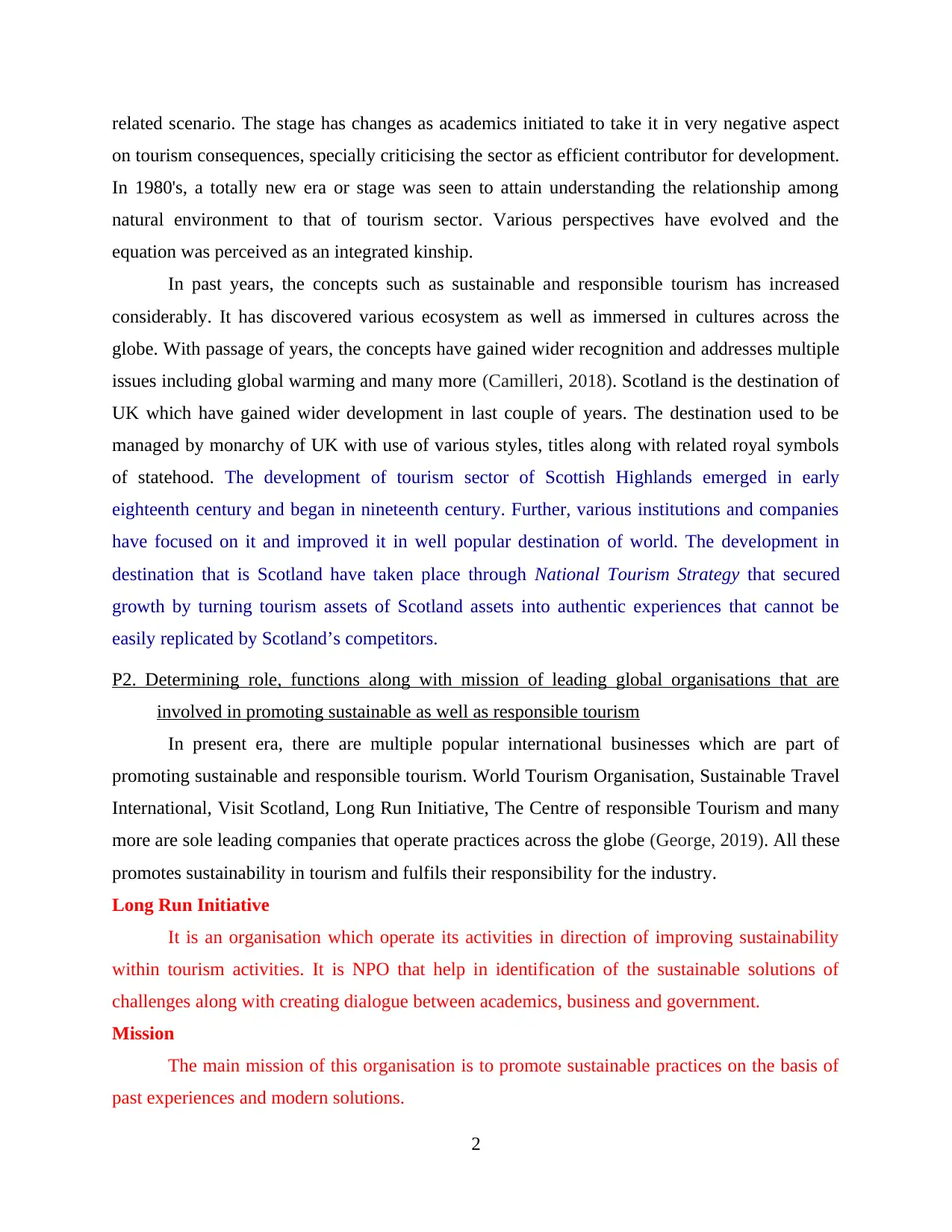
related scenario. The stage has changes as academics initiated to take it in very negative aspect
on tourism consequences, specially criticising the sector as efficient contributor for development.
In 1980's, a totally new era or stage was seen to attain understanding the relationship among
natural environment to that of tourism sector. Various perspectives have evolved and the
equation was perceived as an integrated kinship.
In past years, the concepts such as sustainable and responsible tourism has increased
considerably. It has discovered various ecosystem as well as immersed in cultures across the
globe. With passage of years, the concepts have gained wider recognition and addresses multiple
issues including global warming and many more (Camilleri, 2018). Scotland is the destination of
UK which have gained wider development in last couple of years. The destination used to be
managed by monarchy of UK with use of various styles, titles along with related royal symbols
of statehood. The development of tourism sector of Scottish Highlands emerged in early
eighteenth century and began in nineteenth century. Further, various institutions and companies
have focused on it and improved it in well popular destination of world. The development in
destination that is Scotland have taken place through National Tourism Strategy that secured
growth by turning tourism assets of Scotland assets into authentic experiences that cannot be
easily replicated by Scotland’s competitors.
P2. Determining role, functions along with mission of leading global organisations that are
involved in promoting sustainable as well as responsible tourism
In present era, there are multiple popular international businesses which are part of
promoting sustainable and responsible tourism. World Tourism Organisation, Sustainable Travel
International, Visit Scotland, Long Run Initiative, The Centre of responsible Tourism and many
more are sole leading companies that operate practices across the globe (George, 2019). All these
promotes sustainability in tourism and fulfils their responsibility for the industry.
Long Run Initiative
It is an organisation which operate its activities in direction of improving sustainability
within tourism activities. It is NPO that help in identification of the sustainable solutions of
challenges along with creating dialogue between academics, business and government.
Mission
The main mission of this organisation is to promote sustainable practices on the basis of
past experiences and modern solutions.
2
on tourism consequences, specially criticising the sector as efficient contributor for development.
In 1980's, a totally new era or stage was seen to attain understanding the relationship among
natural environment to that of tourism sector. Various perspectives have evolved and the
equation was perceived as an integrated kinship.
In past years, the concepts such as sustainable and responsible tourism has increased
considerably. It has discovered various ecosystem as well as immersed in cultures across the
globe. With passage of years, the concepts have gained wider recognition and addresses multiple
issues including global warming and many more (Camilleri, 2018). Scotland is the destination of
UK which have gained wider development in last couple of years. The destination used to be
managed by monarchy of UK with use of various styles, titles along with related royal symbols
of statehood. The development of tourism sector of Scottish Highlands emerged in early
eighteenth century and began in nineteenth century. Further, various institutions and companies
have focused on it and improved it in well popular destination of world. The development in
destination that is Scotland have taken place through National Tourism Strategy that secured
growth by turning tourism assets of Scotland assets into authentic experiences that cannot be
easily replicated by Scotland’s competitors.
P2. Determining role, functions along with mission of leading global organisations that are
involved in promoting sustainable as well as responsible tourism
In present era, there are multiple popular international businesses which are part of
promoting sustainable and responsible tourism. World Tourism Organisation, Sustainable Travel
International, Visit Scotland, Long Run Initiative, The Centre of responsible Tourism and many
more are sole leading companies that operate practices across the globe (George, 2019). All these
promotes sustainability in tourism and fulfils their responsibility for the industry.
Long Run Initiative
It is an organisation which operate its activities in direction of improving sustainability
within tourism activities. It is NPO that help in identification of the sustainable solutions of
challenges along with creating dialogue between academics, business and government.
Mission
The main mission of this organisation is to promote sustainable practices on the basis of
past experiences and modern solutions.
2
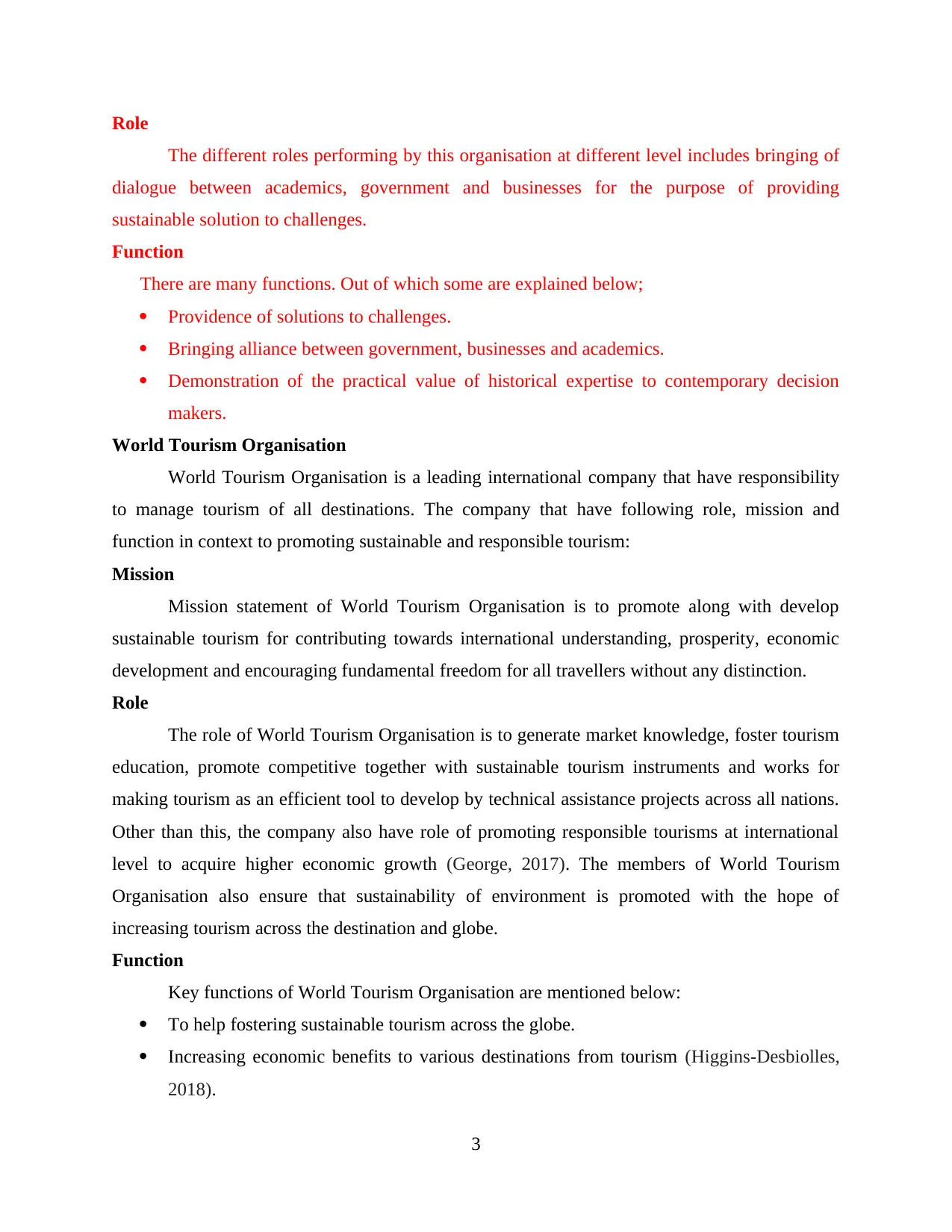
Role
The different roles performing by this organisation at different level includes bringing of
dialogue between academics, government and businesses for the purpose of providing
sustainable solution to challenges.
Function
There are many functions. Out of which some are explained below;
Providence of solutions to challenges.
Bringing alliance between government, businesses and academics.
Demonstration of the practical value of historical expertise to contemporary decision
makers.
World Tourism Organisation
World Tourism Organisation is a leading international company that have responsibility
to manage tourism of all destinations. The company that have following role, mission and
function in context to promoting sustainable and responsible tourism:
Mission
Mission statement of World Tourism Organisation is to promote along with develop
sustainable tourism for contributing towards international understanding, prosperity, economic
development and encouraging fundamental freedom for all travellers without any distinction.
Role
The role of World Tourism Organisation is to generate market knowledge, foster tourism
education, promote competitive together with sustainable tourism instruments and works for
making tourism as an efficient tool to develop by technical assistance projects across all nations.
Other than this, the company also have role of promoting responsible tourisms at international
level to acquire higher economic growth (George, 2017). The members of World Tourism
Organisation also ensure that sustainability of environment is promoted with the hope of
increasing tourism across the destination and globe.
Function
Key functions of World Tourism Organisation are mentioned below:
To help fostering sustainable tourism across the globe.
Increasing economic benefits to various destinations from tourism (Higgins-Desbiolles,
2018).
3
The different roles performing by this organisation at different level includes bringing of
dialogue between academics, government and businesses for the purpose of providing
sustainable solution to challenges.
Function
There are many functions. Out of which some are explained below;
Providence of solutions to challenges.
Bringing alliance between government, businesses and academics.
Demonstration of the practical value of historical expertise to contemporary decision
makers.
World Tourism Organisation
World Tourism Organisation is a leading international company that have responsibility
to manage tourism of all destinations. The company that have following role, mission and
function in context to promoting sustainable and responsible tourism:
Mission
Mission statement of World Tourism Organisation is to promote along with develop
sustainable tourism for contributing towards international understanding, prosperity, economic
development and encouraging fundamental freedom for all travellers without any distinction.
Role
The role of World Tourism Organisation is to generate market knowledge, foster tourism
education, promote competitive together with sustainable tourism instruments and works for
making tourism as an efficient tool to develop by technical assistance projects across all nations.
Other than this, the company also have role of promoting responsible tourisms at international
level to acquire higher economic growth (George, 2017). The members of World Tourism
Organisation also ensure that sustainability of environment is promoted with the hope of
increasing tourism across the destination and globe.
Function
Key functions of World Tourism Organisation are mentioned below:
To help fostering sustainable tourism across the globe.
Increasing economic benefits to various destinations from tourism (Higgins-Desbiolles,
2018).
3
⊘ This is a preview!⊘
Do you want full access?
Subscribe today to unlock all pages.

Trusted by 1+ million students worldwide
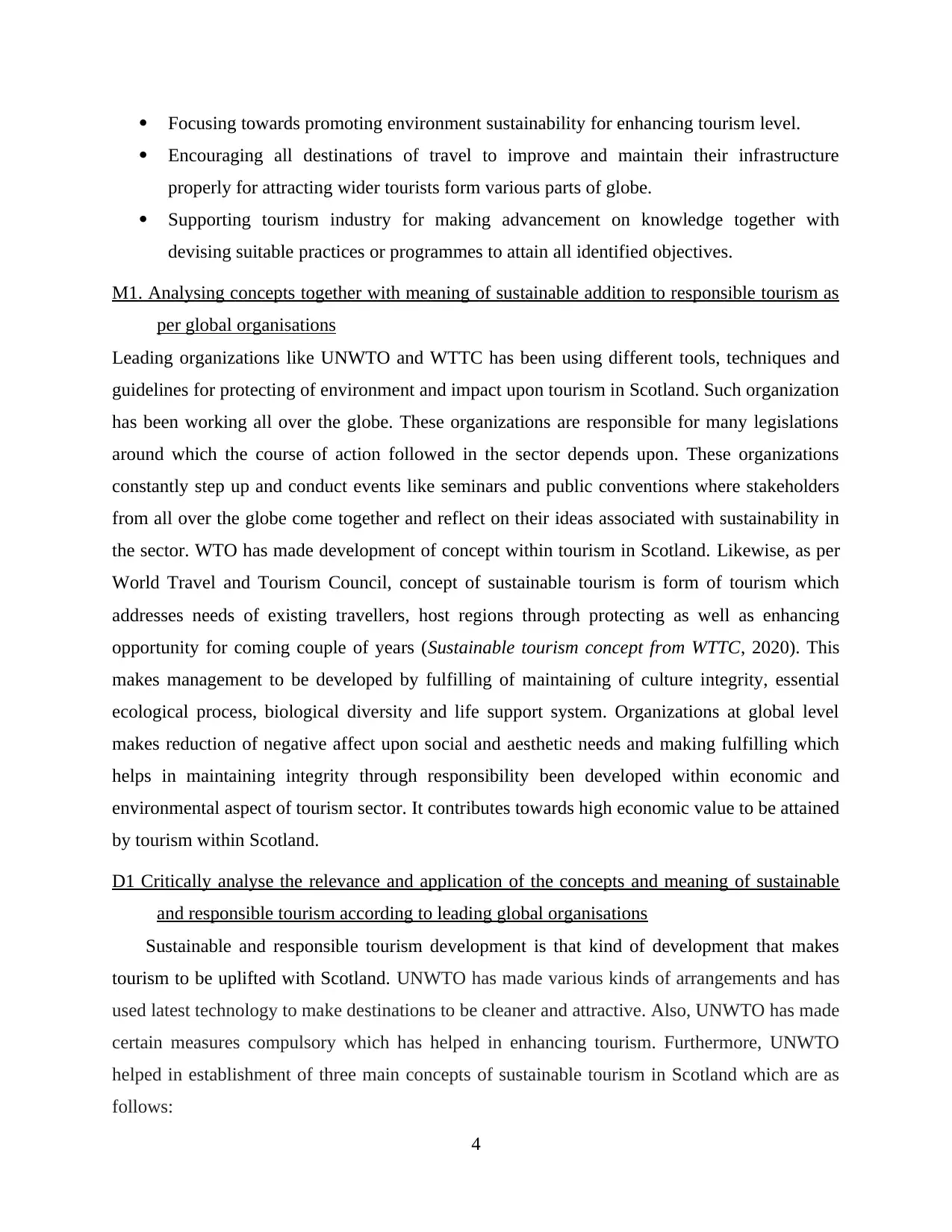
Focusing towards promoting environment sustainability for enhancing tourism level.
Encouraging all destinations of travel to improve and maintain their infrastructure
properly for attracting wider tourists form various parts of globe.
Supporting tourism industry for making advancement on knowledge together with
devising suitable practices or programmes to attain all identified objectives.
M1. Analysing concepts together with meaning of sustainable addition to responsible tourism as
per global organisations
Leading organizations like UNWTO and WTTC has been using different tools, techniques and
guidelines for protecting of environment and impact upon tourism in Scotland. Such organization
has been working all over the globe. These organizations are responsible for many legislations
around which the course of action followed in the sector depends upon. These organizations
constantly step up and conduct events like seminars and public conventions where stakeholders
from all over the globe come together and reflect on their ideas associated with sustainability in
the sector. WTO has made development of concept within tourism in Scotland. Likewise, as per
World Travel and Tourism Council, concept of sustainable tourism is form of tourism which
addresses needs of existing travellers, host regions through protecting as well as enhancing
opportunity for coming couple of years (Sustainable tourism concept from WTTC, 2020). This
makes management to be developed by fulfilling of maintaining of culture integrity, essential
ecological process, biological diversity and life support system. Organizations at global level
makes reduction of negative affect upon social and aesthetic needs and making fulfilling which
helps in maintaining integrity through responsibility been developed within economic and
environmental aspect of tourism sector. It contributes towards high economic value to be attained
by tourism within Scotland.
D1 Critically analyse the relevance and application of the concepts and meaning of sustainable
and responsible tourism according to leading global organisations
Sustainable and responsible tourism development is that kind of development that makes
tourism to be uplifted with Scotland. UNWTO has made various kinds of arrangements and has
used latest technology to make destinations to be cleaner and attractive. Also, UNWTO has made
certain measures compulsory which has helped in enhancing tourism. Furthermore, UNWTO
helped in establishment of three main concepts of sustainable tourism in Scotland which are as
follows:
4
Encouraging all destinations of travel to improve and maintain their infrastructure
properly for attracting wider tourists form various parts of globe.
Supporting tourism industry for making advancement on knowledge together with
devising suitable practices or programmes to attain all identified objectives.
M1. Analysing concepts together with meaning of sustainable addition to responsible tourism as
per global organisations
Leading organizations like UNWTO and WTTC has been using different tools, techniques and
guidelines for protecting of environment and impact upon tourism in Scotland. Such organization
has been working all over the globe. These organizations are responsible for many legislations
around which the course of action followed in the sector depends upon. These organizations
constantly step up and conduct events like seminars and public conventions where stakeholders
from all over the globe come together and reflect on their ideas associated with sustainability in
the sector. WTO has made development of concept within tourism in Scotland. Likewise, as per
World Travel and Tourism Council, concept of sustainable tourism is form of tourism which
addresses needs of existing travellers, host regions through protecting as well as enhancing
opportunity for coming couple of years (Sustainable tourism concept from WTTC, 2020). This
makes management to be developed by fulfilling of maintaining of culture integrity, essential
ecological process, biological diversity and life support system. Organizations at global level
makes reduction of negative affect upon social and aesthetic needs and making fulfilling which
helps in maintaining integrity through responsibility been developed within economic and
environmental aspect of tourism sector. It contributes towards high economic value to be attained
by tourism within Scotland.
D1 Critically analyse the relevance and application of the concepts and meaning of sustainable
and responsible tourism according to leading global organisations
Sustainable and responsible tourism development is that kind of development that makes
tourism to be uplifted with Scotland. UNWTO has made various kinds of arrangements and has
used latest technology to make destinations to be cleaner and attractive. Also, UNWTO has made
certain measures compulsory which has helped in enhancing tourism. Furthermore, UNWTO
helped in establishment of three main concepts of sustainable tourism in Scotland which are as
follows:
4
Paraphrase This Document
Need a fresh take? Get an instant paraphrase of this document with our AI Paraphraser
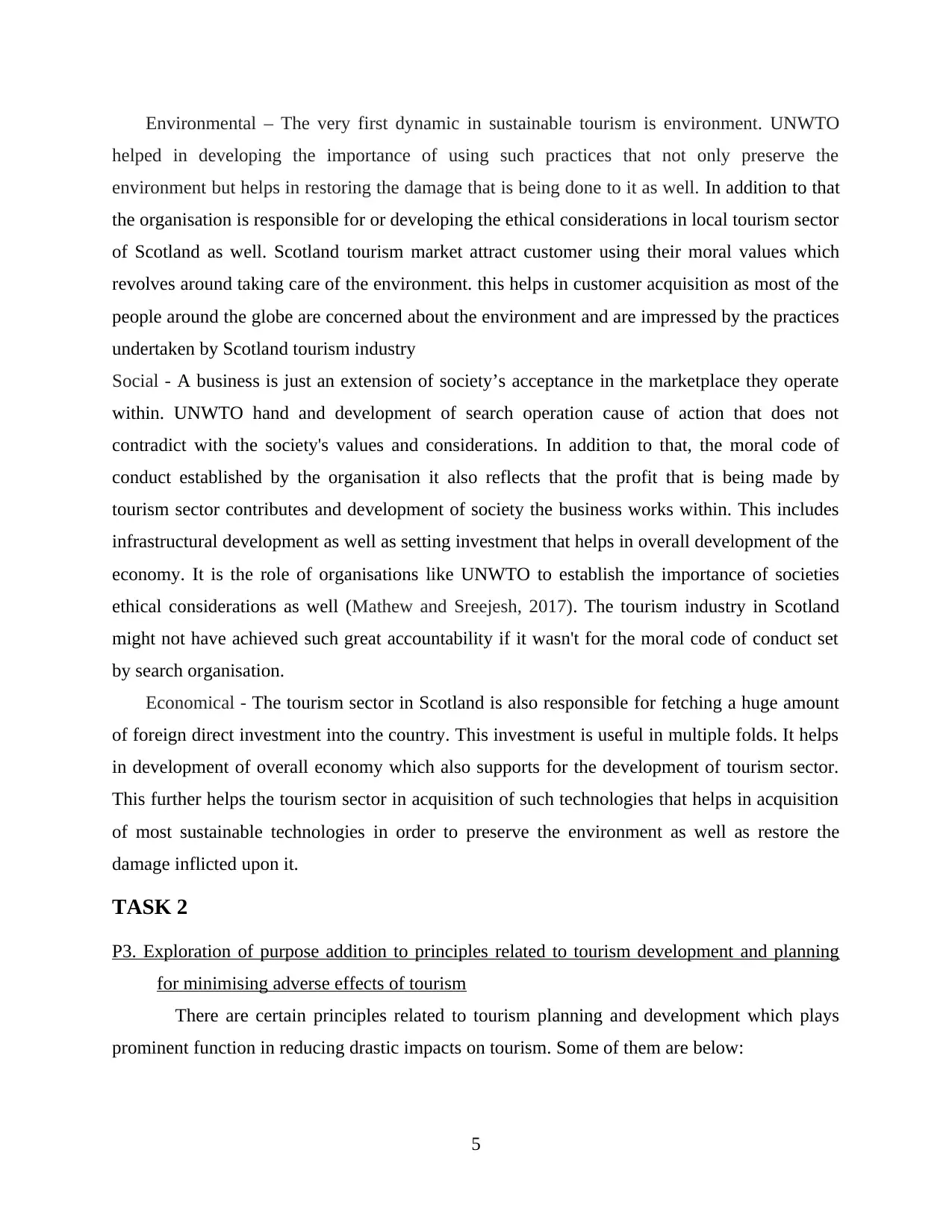
Environmental – The very first dynamic in sustainable tourism is environment. UNWTO
helped in developing the importance of using such practices that not only preserve the
environment but helps in restoring the damage that is being done to it as well. In addition to that
the organisation is responsible for or developing the ethical considerations in local tourism sector
of Scotland as well. Scotland tourism market attract customer using their moral values which
revolves around taking care of the environment. this helps in customer acquisition as most of the
people around the globe are concerned about the environment and are impressed by the practices
undertaken by Scotland tourism industry
Social - A business is just an extension of society’s acceptance in the marketplace they operate
within. UNWTO hand and development of search operation cause of action that does not
contradict with the society's values and considerations. In addition to that, the moral code of
conduct established by the organisation it also reflects that the profit that is being made by
tourism sector contributes and development of society the business works within. This includes
infrastructural development as well as setting investment that helps in overall development of the
economy. It is the role of organisations like UNWTO to establish the importance of societies
ethical considerations as well (Mathew and Sreejesh, 2017). The tourism industry in Scotland
might not have achieved such great accountability if it wasn't for the moral code of conduct set
by search organisation.
Economical - The tourism sector in Scotland is also responsible for fetching a huge amount
of foreign direct investment into the country. This investment is useful in multiple folds. It helps
in development of overall economy which also supports for the development of tourism sector.
This further helps the tourism sector in acquisition of such technologies that helps in acquisition
of most sustainable technologies in order to preserve the environment as well as restore the
damage inflicted upon it.
TASK 2
P3. Exploration of purpose addition to principles related to tourism development and planning
for minimising adverse effects of tourism
There are certain principles related to tourism planning and development which plays
prominent function in reducing drastic impacts on tourism. Some of them are below:
5
helped in developing the importance of using such practices that not only preserve the
environment but helps in restoring the damage that is being done to it as well. In addition to that
the organisation is responsible for or developing the ethical considerations in local tourism sector
of Scotland as well. Scotland tourism market attract customer using their moral values which
revolves around taking care of the environment. this helps in customer acquisition as most of the
people around the globe are concerned about the environment and are impressed by the practices
undertaken by Scotland tourism industry
Social - A business is just an extension of society’s acceptance in the marketplace they operate
within. UNWTO hand and development of search operation cause of action that does not
contradict with the society's values and considerations. In addition to that, the moral code of
conduct established by the organisation it also reflects that the profit that is being made by
tourism sector contributes and development of society the business works within. This includes
infrastructural development as well as setting investment that helps in overall development of the
economy. It is the role of organisations like UNWTO to establish the importance of societies
ethical considerations as well (Mathew and Sreejesh, 2017). The tourism industry in Scotland
might not have achieved such great accountability if it wasn't for the moral code of conduct set
by search organisation.
Economical - The tourism sector in Scotland is also responsible for fetching a huge amount
of foreign direct investment into the country. This investment is useful in multiple folds. It helps
in development of overall economy which also supports for the development of tourism sector.
This further helps the tourism sector in acquisition of such technologies that helps in acquisition
of most sustainable technologies in order to preserve the environment as well as restore the
damage inflicted upon it.
TASK 2
P3. Exploration of purpose addition to principles related to tourism development and planning
for minimising adverse effects of tourism
There are certain principles related to tourism planning and development which plays
prominent function in reducing drastic impacts on tourism. Some of them are below:
5
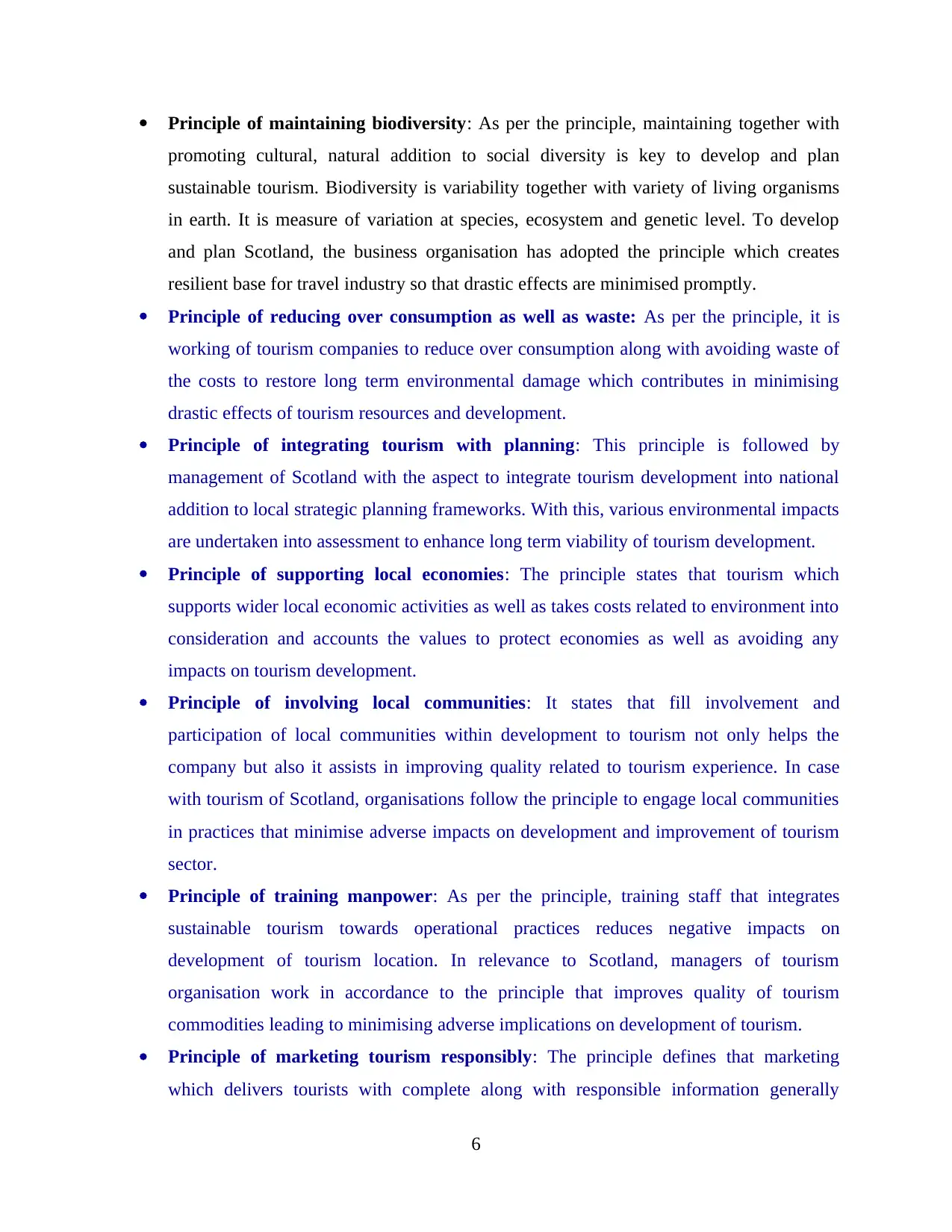
Principle of maintaining biodiversity: As per the principle, maintaining together with
promoting cultural, natural addition to social diversity is key to develop and plan
sustainable tourism. Biodiversity is variability together with variety of living organisms
in earth. It is measure of variation at species, ecosystem and genetic level. To develop
and plan Scotland, the business organisation has adopted the principle which creates
resilient base for travel industry so that drastic effects are minimised promptly.
Principle of reducing over consumption as well as waste: As per the principle, it is
working of tourism companies to reduce over consumption along with avoiding waste of
the costs to restore long term environmental damage which contributes in minimising
drastic effects of tourism resources and development.
Principle of integrating tourism with planning: This principle is followed by
management of Scotland with the aspect to integrate tourism development into national
addition to local strategic planning frameworks. With this, various environmental impacts
are undertaken into assessment to enhance long term viability of tourism development.
Principle of supporting local economies: The principle states that tourism which
supports wider local economic activities as well as takes costs related to environment into
consideration and accounts the values to protect economies as well as avoiding any
impacts on tourism development.
Principle of involving local communities: It states that fill involvement and
participation of local communities within development to tourism not only helps the
company but also it assists in improving quality related to tourism experience. In case
with tourism of Scotland, organisations follow the principle to engage local communities
in practices that minimise adverse impacts on development and improvement of tourism
sector.
Principle of training manpower: As per the principle, training staff that integrates
sustainable tourism towards operational practices reduces negative impacts on
development of tourism location. In relevance to Scotland, managers of tourism
organisation work in accordance to the principle that improves quality of tourism
commodities leading to minimising adverse implications on development of tourism.
Principle of marketing tourism responsibly: The principle defines that marketing
which delivers tourists with complete along with responsible information generally
6
promoting cultural, natural addition to social diversity is key to develop and plan
sustainable tourism. Biodiversity is variability together with variety of living organisms
in earth. It is measure of variation at species, ecosystem and genetic level. To develop
and plan Scotland, the business organisation has adopted the principle which creates
resilient base for travel industry so that drastic effects are minimised promptly.
Principle of reducing over consumption as well as waste: As per the principle, it is
working of tourism companies to reduce over consumption along with avoiding waste of
the costs to restore long term environmental damage which contributes in minimising
drastic effects of tourism resources and development.
Principle of integrating tourism with planning: This principle is followed by
management of Scotland with the aspect to integrate tourism development into national
addition to local strategic planning frameworks. With this, various environmental impacts
are undertaken into assessment to enhance long term viability of tourism development.
Principle of supporting local economies: The principle states that tourism which
supports wider local economic activities as well as takes costs related to environment into
consideration and accounts the values to protect economies as well as avoiding any
impacts on tourism development.
Principle of involving local communities: It states that fill involvement and
participation of local communities within development to tourism not only helps the
company but also it assists in improving quality related to tourism experience. In case
with tourism of Scotland, organisations follow the principle to engage local communities
in practices that minimise adverse impacts on development and improvement of tourism
sector.
Principle of training manpower: As per the principle, training staff that integrates
sustainable tourism towards operational practices reduces negative impacts on
development of tourism location. In relevance to Scotland, managers of tourism
organisation work in accordance to the principle that improves quality of tourism
commodities leading to minimising adverse implications on development of tourism.
Principle of marketing tourism responsibly: The principle defines that marketing
which delivers tourists with complete along with responsible information generally
6
⊘ This is a preview!⊘
Do you want full access?
Subscribe today to unlock all pages.

Trusted by 1+ million students worldwide
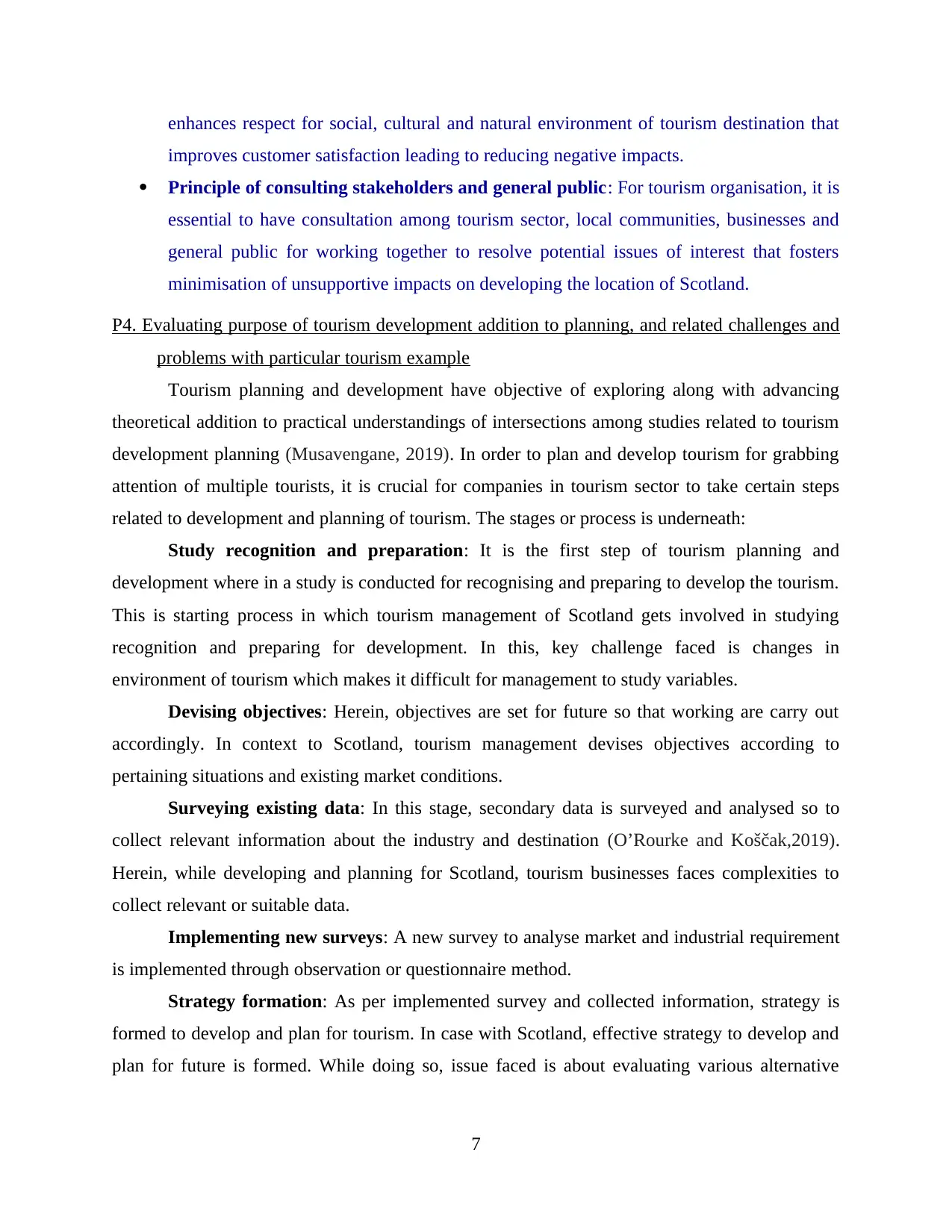
enhances respect for social, cultural and natural environment of tourism destination that
improves customer satisfaction leading to reducing negative impacts.
Principle of consulting stakeholders and general public: For tourism organisation, it is
essential to have consultation among tourism sector, local communities, businesses and
general public for working together to resolve potential issues of interest that fosters
minimisation of unsupportive impacts on developing the location of Scotland.
P4. Evaluating purpose of tourism development addition to planning, and related challenges and
problems with particular tourism example
Tourism planning and development have objective of exploring along with advancing
theoretical addition to practical understandings of intersections among studies related to tourism
development planning (Musavengane, 2019). In order to plan and develop tourism for grabbing
attention of multiple tourists, it is crucial for companies in tourism sector to take certain steps
related to development and planning of tourism. The stages or process is underneath:
Study recognition and preparation: It is the first step of tourism planning and
development where in a study is conducted for recognising and preparing to develop the tourism.
This is starting process in which tourism management of Scotland gets involved in studying
recognition and preparing for development. In this, key challenge faced is changes in
environment of tourism which makes it difficult for management to study variables.
Devising objectives: Herein, objectives are set for future so that working are carry out
accordingly. In context to Scotland, tourism management devises objectives according to
pertaining situations and existing market conditions.
Surveying existing data: In this stage, secondary data is surveyed and analysed so to
collect relevant information about the industry and destination (O’Rourke and Koščak,2019).
Herein, while developing and planning for Scotland, tourism businesses faces complexities to
collect relevant or suitable data.
Implementing new surveys: A new survey to analyse market and industrial requirement
is implemented through observation or questionnaire method.
Strategy formation: As per implemented survey and collected information, strategy is
formed to develop and plan for tourism. In case with Scotland, effective strategy to develop and
plan for future is formed. While doing so, issue faced is about evaluating various alternative
7
improves customer satisfaction leading to reducing negative impacts.
Principle of consulting stakeholders and general public: For tourism organisation, it is
essential to have consultation among tourism sector, local communities, businesses and
general public for working together to resolve potential issues of interest that fosters
minimisation of unsupportive impacts on developing the location of Scotland.
P4. Evaluating purpose of tourism development addition to planning, and related challenges and
problems with particular tourism example
Tourism planning and development have objective of exploring along with advancing
theoretical addition to practical understandings of intersections among studies related to tourism
development planning (Musavengane, 2019). In order to plan and develop tourism for grabbing
attention of multiple tourists, it is crucial for companies in tourism sector to take certain steps
related to development and planning of tourism. The stages or process is underneath:
Study recognition and preparation: It is the first step of tourism planning and
development where in a study is conducted for recognising and preparing to develop the tourism.
This is starting process in which tourism management of Scotland gets involved in studying
recognition and preparing for development. In this, key challenge faced is changes in
environment of tourism which makes it difficult for management to study variables.
Devising objectives: Herein, objectives are set for future so that working are carry out
accordingly. In context to Scotland, tourism management devises objectives according to
pertaining situations and existing market conditions.
Surveying existing data: In this stage, secondary data is surveyed and analysed so to
collect relevant information about the industry and destination (O’Rourke and Koščak,2019).
Herein, while developing and planning for Scotland, tourism businesses faces complexities to
collect relevant or suitable data.
Implementing new surveys: A new survey to analyse market and industrial requirement
is implemented through observation or questionnaire method.
Strategy formation: As per implemented survey and collected information, strategy is
formed to develop and plan for tourism. In case with Scotland, effective strategy to develop and
plan for future is formed. While doing so, issue faced is about evaluating various alternative
7
Paraphrase This Document
Need a fresh take? Get an instant paraphrase of this document with our AI Paraphraser
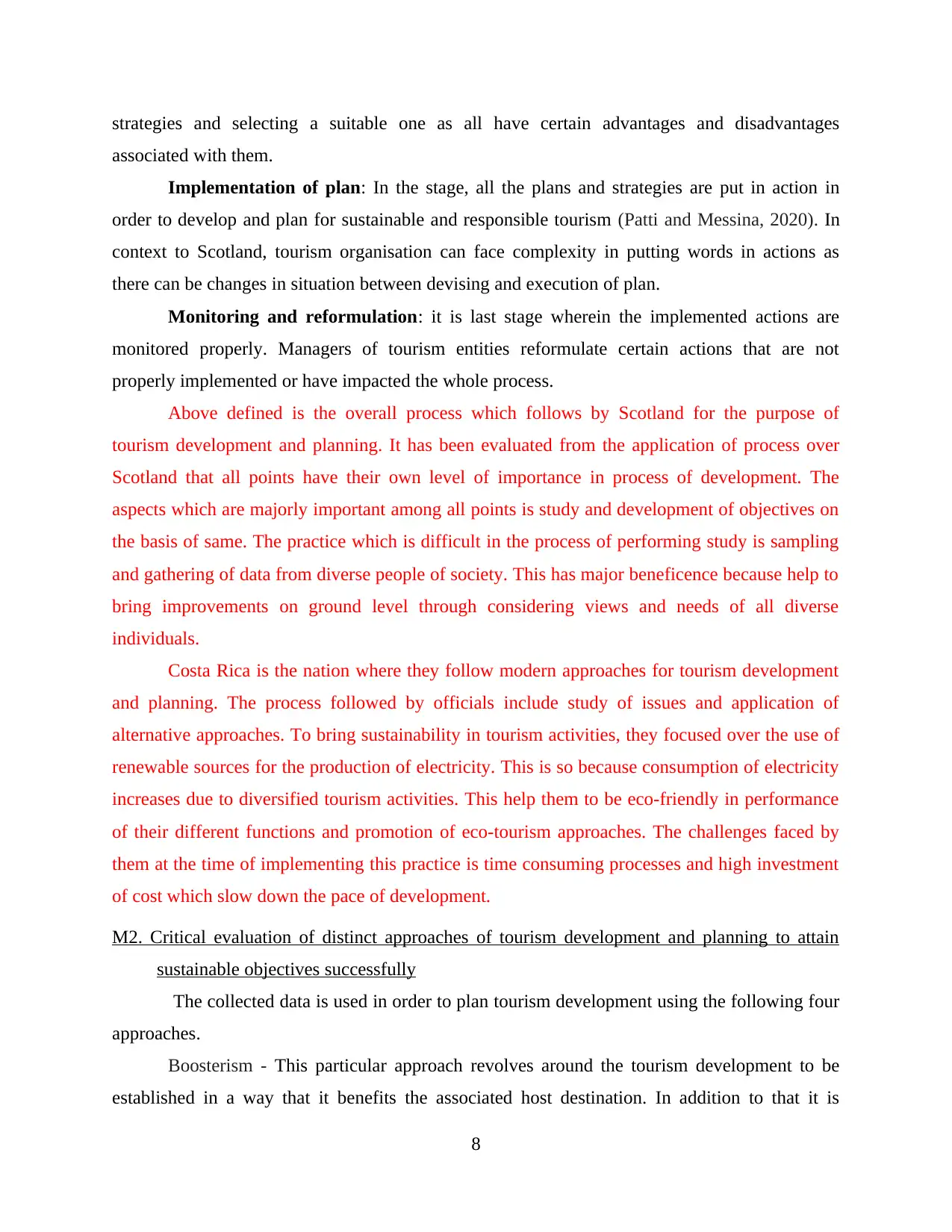
strategies and selecting a suitable one as all have certain advantages and disadvantages
associated with them.
Implementation of plan: In the stage, all the plans and strategies are put in action in
order to develop and plan for sustainable and responsible tourism (Patti and Messina, 2020). In
context to Scotland, tourism organisation can face complexity in putting words in actions as
there can be changes in situation between devising and execution of plan.
Monitoring and reformulation: it is last stage wherein the implemented actions are
monitored properly. Managers of tourism entities reformulate certain actions that are not
properly implemented or have impacted the whole process.
Above defined is the overall process which follows by Scotland for the purpose of
tourism development and planning. It has been evaluated from the application of process over
Scotland that all points have their own level of importance in process of development. The
aspects which are majorly important among all points is study and development of objectives on
the basis of same. The practice which is difficult in the process of performing study is sampling
and gathering of data from diverse people of society. This has major beneficence because help to
bring improvements on ground level through considering views and needs of all diverse
individuals.
Costa Rica is the nation where they follow modern approaches for tourism development
and planning. The process followed by officials include study of issues and application of
alternative approaches. To bring sustainability in tourism activities, they focused over the use of
renewable sources for the production of electricity. This is so because consumption of electricity
increases due to diversified tourism activities. This help them to be eco-friendly in performance
of their different functions and promotion of eco-tourism approaches. The challenges faced by
them at the time of implementing this practice is time consuming processes and high investment
of cost which slow down the pace of development.
M2. Critical evaluation of distinct approaches of tourism development and planning to attain
sustainable objectives successfully
The collected data is used in order to plan tourism development using the following four
approaches.
Boosterism - This particular approach revolves around the tourism development to be
established in a way that it benefits the associated host destination. In addition to that it is
8
associated with them.
Implementation of plan: In the stage, all the plans and strategies are put in action in
order to develop and plan for sustainable and responsible tourism (Patti and Messina, 2020). In
context to Scotland, tourism organisation can face complexity in putting words in actions as
there can be changes in situation between devising and execution of plan.
Monitoring and reformulation: it is last stage wherein the implemented actions are
monitored properly. Managers of tourism entities reformulate certain actions that are not
properly implemented or have impacted the whole process.
Above defined is the overall process which follows by Scotland for the purpose of
tourism development and planning. It has been evaluated from the application of process over
Scotland that all points have their own level of importance in process of development. The
aspects which are majorly important among all points is study and development of objectives on
the basis of same. The practice which is difficult in the process of performing study is sampling
and gathering of data from diverse people of society. This has major beneficence because help to
bring improvements on ground level through considering views and needs of all diverse
individuals.
Costa Rica is the nation where they follow modern approaches for tourism development
and planning. The process followed by officials include study of issues and application of
alternative approaches. To bring sustainability in tourism activities, they focused over the use of
renewable sources for the production of electricity. This is so because consumption of electricity
increases due to diversified tourism activities. This help them to be eco-friendly in performance
of their different functions and promotion of eco-tourism approaches. The challenges faced by
them at the time of implementing this practice is time consuming processes and high investment
of cost which slow down the pace of development.
M2. Critical evaluation of distinct approaches of tourism development and planning to attain
sustainable objectives successfully
The collected data is used in order to plan tourism development using the following four
approaches.
Boosterism - This particular approach revolves around the tourism development to be
established in a way that it benefits the associated host destination. In addition to that it is
8
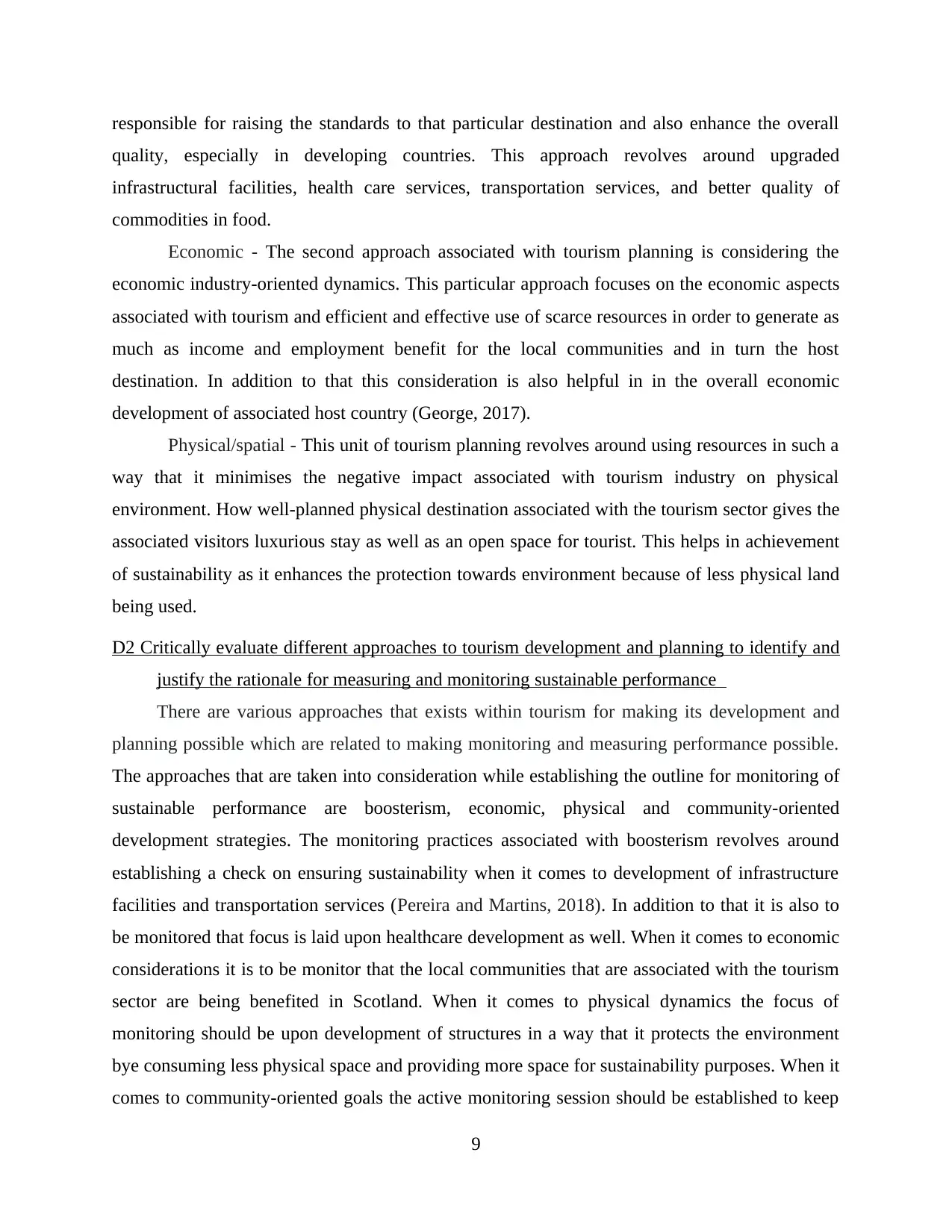
responsible for raising the standards to that particular destination and also enhance the overall
quality, especially in developing countries. This approach revolves around upgraded
infrastructural facilities, health care services, transportation services, and better quality of
commodities in food.
Economic - The second approach associated with tourism planning is considering the
economic industry-oriented dynamics. This particular approach focuses on the economic aspects
associated with tourism and efficient and effective use of scarce resources in order to generate as
much as income and employment benefit for the local communities and in turn the host
destination. In addition to that this consideration is also helpful in in the overall economic
development of associated host country (George, 2017).
Physical/spatial - This unit of tourism planning revolves around using resources in such a
way that it minimises the negative impact associated with tourism industry on physical
environment. How well-planned physical destination associated with the tourism sector gives the
associated visitors luxurious stay as well as an open space for tourist. This helps in achievement
of sustainability as it enhances the protection towards environment because of less physical land
being used.
D2 Critically evaluate different approaches to tourism development and planning to identify and
justify the rationale for measuring and monitoring sustainable performance
There are various approaches that exists within tourism for making its development and
planning possible which are related to making monitoring and measuring performance possible.
The approaches that are taken into consideration while establishing the outline for monitoring of
sustainable performance are boosterism, economic, physical and community-oriented
development strategies. The monitoring practices associated with boosterism revolves around
establishing a check on ensuring sustainability when it comes to development of infrastructure
facilities and transportation services (Pereira and Martins, 2018). In addition to that it is also to
be monitored that focus is laid upon healthcare development as well. When it comes to economic
considerations it is to be monitor that the local communities that are associated with the tourism
sector are being benefited in Scotland. When it comes to physical dynamics the focus of
monitoring should be upon development of structures in a way that it protects the environment
bye consuming less physical space and providing more space for sustainability purposes. When it
comes to community-oriented goals the active monitoring session should be established to keep
9
quality, especially in developing countries. This approach revolves around upgraded
infrastructural facilities, health care services, transportation services, and better quality of
commodities in food.
Economic - The second approach associated with tourism planning is considering the
economic industry-oriented dynamics. This particular approach focuses on the economic aspects
associated with tourism and efficient and effective use of scarce resources in order to generate as
much as income and employment benefit for the local communities and in turn the host
destination. In addition to that this consideration is also helpful in in the overall economic
development of associated host country (George, 2017).
Physical/spatial - This unit of tourism planning revolves around using resources in such a
way that it minimises the negative impact associated with tourism industry on physical
environment. How well-planned physical destination associated with the tourism sector gives the
associated visitors luxurious stay as well as an open space for tourist. This helps in achievement
of sustainability as it enhances the protection towards environment because of less physical land
being used.
D2 Critically evaluate different approaches to tourism development and planning to identify and
justify the rationale for measuring and monitoring sustainable performance
There are various approaches that exists within tourism for making its development and
planning possible which are related to making monitoring and measuring performance possible.
The approaches that are taken into consideration while establishing the outline for monitoring of
sustainable performance are boosterism, economic, physical and community-oriented
development strategies. The monitoring practices associated with boosterism revolves around
establishing a check on ensuring sustainability when it comes to development of infrastructure
facilities and transportation services (Pereira and Martins, 2018). In addition to that it is also to
be monitored that focus is laid upon healthcare development as well. When it comes to economic
considerations it is to be monitor that the local communities that are associated with the tourism
sector are being benefited in Scotland. When it comes to physical dynamics the focus of
monitoring should be upon development of structures in a way that it protects the environment
bye consuming less physical space and providing more space for sustainability purposes. When it
comes to community-oriented goals the active monitoring session should be established to keep
9
⊘ This is a preview!⊘
Do you want full access?
Subscribe today to unlock all pages.

Trusted by 1+ million students worldwide
1 out of 20
Related Documents
Your All-in-One AI-Powered Toolkit for Academic Success.
+13062052269
info@desklib.com
Available 24*7 on WhatsApp / Email
![[object Object]](/_next/static/media/star-bottom.7253800d.svg)
Unlock your academic potential
Copyright © 2020–2026 A2Z Services. All Rights Reserved. Developed and managed by ZUCOL.





